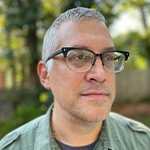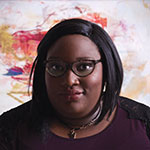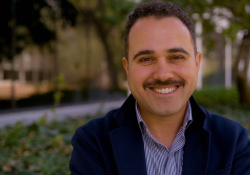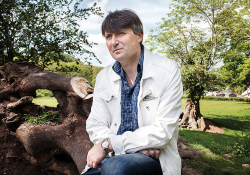“If I Strip away Everything, What Is Left?”: A Conversation with Chris Abani
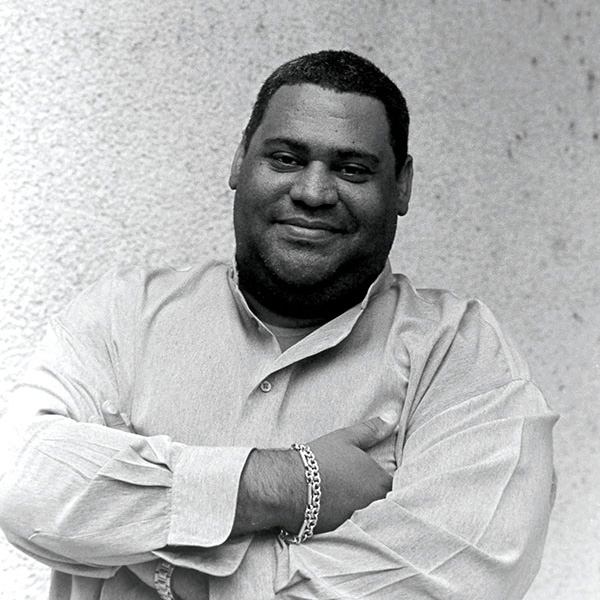
Chris Abani is a poet, novelist, essayist, playwright, and screenwriter whose awards include the PEN USA Freedom to Write Award, a Hurston/Wright Legacy Award, and the PEN Hemingway Book Prize, among others. In this interview, conducted while visiting Oklahoma City University in April as part of OCU’s Thatcher Hoffman Smith Poetry Series, Abani discusses the central questions in his work, poetry as soprano sax and chapel, and why we need James Baldwin’s voice now.
Rob Roensch: So we’ll start with kind of a big question. You’ve said that you agree with Toni Morrison that writers are ultimately driven by one central concern or question. What’s that central concern for you, and where in your work do you think you’ve engaged with it most successfully?
Attached to the idea of becoming is one other question: how far into darkness can a human soul travel and still be able to chart its way back?
Chris Abani: I think the central question for me is a question of becoming: How do we become who we become, and what is the process of becoming? Except for in [my novels] The Secret History of Las Vegas and The Virgin of Flames, all my protagonists are teenagers; I think it’s really at about fifteen or sixteen that the birth of a conscience starts to happen, and a sense of self and relationship. So I think all the work I do is about becoming, but in Becoming Abigail, Song for Night, and Graceland, I think you’ll see it more clearly drawn because it’s when people are much younger and they are really engaging with the world in many ways for the first time. But everything else is really about that—the poems, all of it. Even the conceit of Santificum, which is the idea of transubstantiation—turning the bread and the wine into the blood and the body of Christ—is again this notion of becoming. I think this idea of becoming is very close to notions of transformation or change.
And attached to the idea of becoming is one other question: how far into darkness can a human soul travel and still be able to chart its way back? I think these two things are linked for me.
Mary B. Gray: As an author who writes both poetry and fiction, what does your poetry offer to readers that your prose cannot/does not and vice versa? And what do you think is the role of the poet versus the role of the prose writer?
Abani: I actually think that writing—in fact art as a whole—is on a continuum. The same way that gender is on a continuum, sexuality is on a continuum, and people stop on that continuum wherever it makes them comfortable. For me, I write everything from poetry to fiction, nonfiction, and critical essays. I do a lot of editorial stuff. I do screenplays. I’m comfortable along the spectrum because part of it has to do with identity. I am Chris primarily and a writer secondarily, so I don’t have any strong positions to hold about form or genre, which makes it easier for me to flow along that spectrum. Once you begin to master the specifics of the particular ways in which particular forms and genres perform—if you understand the performance and practice it—then you can move in that way. And over the years, I’ve come to understand things about craft.
I think of writing the way I think of tailoring. You can see that I’m not a small man; I’m generously proportioned. If I went to a tailor in summer and I said to the tailor, “I want you to make me a red velvet three-piece suit,” hopefully he would try to dissuade me. Because, at best I may look like Barry White at his height, and at worst I look like a pimp from a bad seventies movie. But more importantly, I’m going to look silly because there’s a larger surface area that is suddenly bright red, and then it’s going to be so hot that I’m going to perspire. So you hope the tailor will go, “Listen, man, I have a better idea—how about we use this linen. It’s a linen-cotton blend so the cotton will help it hold a little bit together, but it’s linen so it’s going to be cooler. And you’re going to crease clothes because of your size, but then linen looks cool creased.”
So this is how I approach writing as a craft—a craft the way you learn how to make a table, the way you learn how to bake a cake. I don’t think there’s anything mystical. What I started to understand is that there are certain things that fall better in certain forms. For instance, Kalakuta Republic is a book of poems about being in prison. First of all, I didn’t want it to be about me; I wanted it to be through me but looking at the other prisoners and really talking about the amazing kinds of miracles that happen in places with people that you wouldn’t think would be able to perform those miracles. Prose would have been too hard because that would have meant a 250-page memoir, which then becomes “okay, then they took these people out; then they did this to them.” How much of that can somebody stand for 250 pages? Whereas the beauty of poetry is, even if the book of poems is a hundred pages, each poem is engaging with one aspect and you can put the book down. Poems invite you to step in and step out. You can skip a poem that you’re not ready to read and read another one. The form itself allows for someone to engage fully with this painfully visceral material without overwhelming them.
I approach writing as a craft—a craft the way you learn how to make a table, the way you learn how to bake a cake. I don’t think there’s anything mystical.
What I’ve come to realize is that poetry for me is the hardest form. I play musical instruments—I think of poetry as a soprano saxophone, which is a very high-pitched instrument. If you make a mistake on a soprano saxophone, it sounds like you made a mistake, because it suddenly goes out of tune and you have no way to cover for it. But if you’re playing a tenor saxophone and you hit a note that you shouldn’t—it’s called “harmonics.” So then you just play it again and again and it becomes part of the music and people say, “Aw, I love that, that’s really avant-garde.” But in poetry there’s no room for mistakes; it’s an oversaturated form. Poetry is the ultimate text of transformation. It’s like a chapel. If you think of the book as the main cathedral, because you put it all together, each poem is like a little chapel. People come to the chapel and they can sit in front of the Virgin or the Sacred Heart and have an experience in this quiet corner of the church while everything else is going on. A really good poem is making space for somebody to bring their own baggage, their own suffering, and find a space for release that is not only cathartic but also transformational. That’s how I think about poetry, and that’s why I choose certain subject matters for poetry.
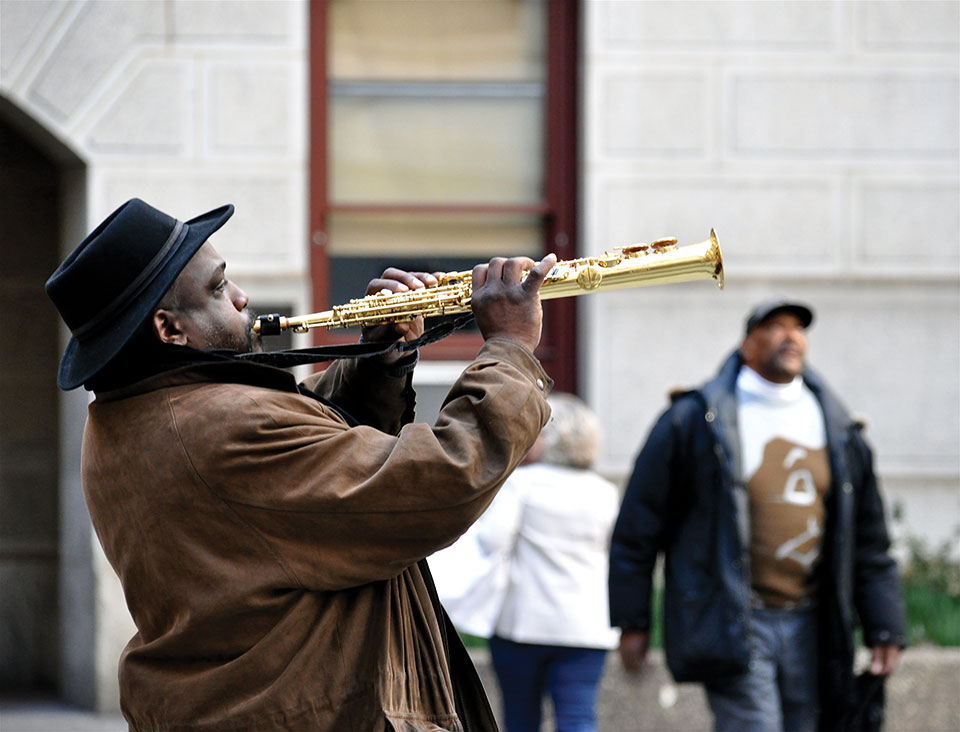
I think of poetry as a soprano saxophone, which is a very high-pitched instrument. If you make a mistake on a soprano saxophone, it sounds like you made a mistake, because it suddenly goes out of tune and you have no way to cover for it.
Sometimes I make political decisions, like how Daphne’s Lot was about my mother. I was looking at this idea of a white English woman in a black African war with five biracial kids making her way through this landscape. And I chose that as a subject because all epics are about men. There’s never really been an epic about a woman, so I decided to write an epic about a woman and set it in the traditional form of war yet set her not as the warrior but as the true survivor of war. Because women and children are always the terrain on which war is worked out. The form I chose, couplets, is a form that allows for a certain kind of sentimental restraint but still allows emotion, so it can work as a narrative flow.
These are the kinds of considerations poetry offers. Prose offers a much flabbier, funner, easier engagement with the world where you can make mistakes and there’s a lot of room for misunderstanding, which is great. Over time I’ve developed an instinct to know what would work best with what.
Roensch: How does your thinking about working in different forms extend to your work in different genres within fiction? When you’re thinking about the relationship between a traditional, literary novel and a book like your latest novel, The Secret History of Las Vegas, which is this wonderful, crazy detective story, how do you think about the differences?
Abani: First of all, I just want to say that I’m really happy that you called literary fiction a genre because I think in the mind of many writers it’s the norm and everything is a genre orbiting it, and that explains why a lot of literary fiction novels are really unreadable. Sometimes genre is looked down on when you learn to actually write a story. Let’s go back to Toni Morrison. If you take Beloved, at a very basic level Beloved is a terrifying ghost story. A mother kills her baby and then the baby haunts her. This is the stuff of every horror film. And she writes it so that your hair stands up when you’re reading that book. You can actually read Beloved on a plane trip and just have a good thorough scare and then leave it on the seat. And someone else will pick it up and read it and go, “Oh my god, this is not only about the notion of African American history but about who gets to name whose history.” Underneath the narrative are these deeper questions.
I think about writing as layered. There’s a seventeenth-century critic—I think his name is Giambattista Vico—who writes about language, about the way in which language is situational, and as you start to excavate it, you start to find origins, but also how it changes when it moves location and what all this can mean. To really understand any language you’re working in, you need to excavate it. There are ways in which, if you understood Old English, you would understand American English even better, and you would understand that some of the accents that are used in places like Appalachia are very close to early English accents from Dover and Coventry.
This is fascinating to me, not only on a linguistic level but on a formal level. Certain genres help tell a story better. So, when I wrote The Secret History of Las Vegas, I wanted to contend with not just the idea of a whodunit but rather the idea in which solving a mystery is a form of archaeology—what does this archaeology start to reveal? And then there’s all these layers of Vegas. Someone described it as a “transnational deconstruction of identity via a crime fiction novel.”
I think genres are beautiful. If you were to read anything by Octavia Butler, who writes science fiction, you have to ask, “How is that not literary fiction?” And I’ve noticed that men write science fiction differently than women. Men expand: frontiers and space. And women look at the dissolution of culture, the dissolution of society and how it can be reconstructed. So the idea is to bring in aliens as a means to understand the self rather than as a means to show conquest.
For me there are no clear boundaries about anything, and everything can flow into something else, and that’s what I think a nation is—a cacophony of voices—and yet the only thing that holds it together is a kind of shared love.
All that begins to feed into how I use genre and how I think of genre. I grew up in a small town, and when I’d exhausted my parents’ shelves of books, I would then go to the local library, which had four shelves that just weren’t organized. So you read Crime and Punishment and it’s next to Silver Surfer and it’s next to James Baldwin. I developed this nonhierarchical relationship to literature, so I don’t see genre in terms of hierarchy, I see it in terms of lateralness, and I think everything feeds into something else.
Gray: Concerning how you write about history in your poetry, especially in persona poems: how do you decide what to write about?
Abani: The choices for me are very selfish in the sense that I stumble on ideas about history that intrigue me, but I’m never interested in History with big H’s; I’m only interested in histories of people. I think this is where I deviate, even in the academy.
I pick subjects that are almost always erased from the historical record. So, when I picked “Buffalo Women,” I imagined all these black women who bound their breasts to join up to fight in the Civil War, on either side. I think poetry allows you to cover a huge historical space in twelve poems, whereas if I were to write prose, the same topic would take two or three hundred pages.
Gray: It seems like you have a wide range of varied interests, and that comes through in your work. Are these connections made organically, or do you set out with overlapping interests when coming to a poem? In other words, where do you find your inspiration?
Abani: I don’t even think of inspiration. I think over the years my brain has come to the understanding that work percolates. I think that I have ideas, and I sit around and try to figure them out. The new book of poems that I’ve been working on is about my brother Greg and me. It started out about a summer when he was thirteen and I was nine. We wanted to smoke cigarettes, but no one wanted to sell any to us, so we ended up helping ourselves to our father’s King James Bible, because it’s like onion paper—perfect cigarette paper. We went through this heavy ornate Bible and tore out pages in Psalms and rolled them up, put oregano in it, and puffed away. So I started to think about how the Bible is full of the idea of sacrifices. As sacrifices burn, the smoke goes up to God.
I wanted the book to be about brothers, and the book wasn’t coming together. I went off and wrote a small book about my parents’ marriage, but this other book kept coming and I couldn’t figure out what was holding it up. Then, in the middle of it, I was talking to my brother on the phone in January of last year, and I said, “I’m stuck trying to write this book about us; are you okay with this anyway?” And he was like, “No, I’m not okay with it, have you noticed that whenever you start writing a book about someone in the family they die?” Then in April he got diagnosed with terminal cancer, so for months I was sitting next to his bed, and we started to talk, and he wanted to talk about a particular period in our lives. These stories started coming back, and then I realized what had been missing, sick or not sick, was that to re-create that summer I had to sit with Greg and really talk in these profound ways. Then the poems started flowing again. Part of it is just trusting that, organically, things will be what they are, and the book has become really something quite profound and bigger even than it could have been before.
I always think of myself as Chris, but to a lot of people I’m “Chris Abani,” and I don’t know who that is. I used to think it meant the same thing as Chris, but it doesn’t; it’s a product that people invest things into. I think because I remain a human being I have other artistic interests. One of them is photography, and I think I’m good at it. So I take photographs, and I try to take a photo a day, because that gives me instant art, so I feel like I’ve made something that day, something that is beyond me, something that is bigger than me.
Also, music is a really important part of my life. For Sanctificum, the whole book is a symphony composed to Bach’s major symphonies, but the emotional music is a Latin order of mass, which is why in certain places it has a kind of chant. And I learned that from Derek Walcott: in Omeros he takes Homer’s Odyssey and places it in the Caribbean, and he takes the terza rima, but the musical quality he uses alternates between calypso and reggae—the same kind of syllabic structures. So I do that same kind of thing. I find myself choosing music for the books but not trying to inject it in any other way than thinking about what music can carry these things.
Gray: Your work seems to be filled with sound and musicality. Why is this poetic element so important to you?
Abani: I think maybe poetry is taught badly in high school, and music doesn’t seem to be a part of it at all. It all seems to be working out an essay on line breaks. So the thing that carries everything, this attention to music, is gone. But everybody has music. I love listening to accents, and I love listening to people talk, because every human being is a walking music.
I grew up in an inferential culture—everything is a proverb. You’re not looking for meaning, you’re looking for sense, which is a different thing. For instance, my father would threaten me all the time with things like, “When I slap you, you will use your teeth to count your tongue.” And I’d think, “What does that even mean?” But also, the language I grew up with, Igbo, is a musical language, and even things that are really hard to say, when said in certain linguistic forms, become beautiful. So I’m fully aware of music, and I listen to it, I hear it. Even people’s body gestures have music, so it’s a very conscious choice.
Roensch: One of the things that struck me so much about Graceland and The Secret History of Las Vegas is that they are both about a particular place, but they are also so much about characters who are deeply connected to other places in their past. We often talk about novels like they have national identities, but it seems like these novels try to resist that kind of confinement, so I wonder if you plan your novels that way or if that’s just writing about the world as it is.
Abani: I think it’s a bit of both. Part of it has to do with my privileges growing up the way I did. I grew up in a country of all black people, for the most part, with a white mother. So, since my mother is white and my father is black, I am equally black and equally white—I’m not half black or half white. It’s confusing for people to understand what biraciality really means; it’s actually that you occupy two full identities. My entire relationship to whiteness is different than, say, if I had grown up without whiteness within me. Then I lived in Nigeria, a country where power resides in everyone who looked like me. Racism only exists within the context of global capitalism—not in the context of actual, biological race. Access to power was not limited in that way, so I have these different worldviews. I grew up learning two simultaneous languages—Igbo and English. And I grew up in the seventies, in a time when Nigeria was its most cosmopolitan. So for me there are no clear boundaries about anything, and everything can flow into something else, and that’s what I think a nation is—a cacophony of voices—and yet the only thing that holds it together is a kind of shared love. And not a love in the Hallmark sense but a love in the drive to survive. That is love. If you realize that we can’t survive as distinct racial categories, half of this stuff would go away because you realize that your survival is dependent.
So, when I write novels, they’re automatically transnational. They just are, because there’s no way not to be. Because that’s my experience of nation growing up, for good or for bad, and none of this is pretty, it’s all really dark. Then again, a lot of humor is from the darkness. The Secret History of Las Vegas is essentially Johannesburg grafted onto Las Vegas, and the graft becomes easy because they share these common histories of people.
What’s happened with imperial consciousness is you will assimilate, but then imperialism will erase the original source, whereas true syncretism keeps both the originator of the idea and the stolen idea, and all of it goes into one seamless history. When I write, I think in those kinds of terms: What are the things we want to keep from being erased?
So my novels are the re-creating of chaos that we don’t want to believe that we live in, and that’s what I think of a nation. It’s like a beautiful, controlled chaos held together simply by the desire to continue to survive.
It’s always teetering on this sort of apocalypse, and that’s what I love about cities. Mexico City, Cairo, Tokyo, Rio de Janeiro: these are cities. London is a small town. New York is a small town.
Roensch: That connects to another question I had about cities. Why do you write so much about cities? And why different cities?
Abani: The funny thing is I grew up in a small town. In Nigeria a small town is seventy thousand people, because there’s two hundred million or more of us in the country, but everyone knows your business. I grew up in a modern, middle-class environment; it was very normative, very stifling. I would yearn for cities because every time I would hitchhike and go visit cities, they just seemed to be like everything was being barely held together.
So there’s something apocalyptic about cities, and there are cities here that I don’t think of as cities; I think of as small towns. New York is a small town. It has the buildings of a city, but it only references itself, and self-referentiality is the mark of a small town. When people talk about New York, they don’t really mean New York, they don’t even actually mean Brooklyn, they mean Park Slope, Bed-Stuy, and this to them becomes New York. A city for me is Los Angeles; it’s layered with people from New York, people just coming from Mexico, people coming from Iran, it’s all these people living on a history, in a place where a city shouldn’t even exist. Los Angeles exists because they stole all the water from Colorado. This is a great Nigerian concept: let’s go up to a place where nothing should exist and force it to exist. So it’s always teetering on this sort of apocalypse, and that’s what I love about cities. Mexico City, Cairo, Tokyo, Rio de Janeiro: these are cities. London is a small town. New York is a small town. I think my fascination with cities is the same as my understanding of nation. It’s a place that shouldn’t but has to exist. And I think there’s a lot underlying there about what a human being is. I think human beings should be messy and chaotic.
Roensch: I had a question about James Baldwin. I know you’ve talked about him, and he pops up in some of your books. I feel like his voice has come back recently in a forceful way. I wondered if you could talk about him and why you think we’re hearing from him now.
Abani: When I was ten, during the summer, four things stood out. One was I read Dostoevsky’s Crime and Punishment and felt an immediate connection with Raskolnikov, the sort of protagonist, because he is in this existential melancholy. I read the Silver Surfer Omnibus of that year and fell in love with the Silver Surfer because the Silver Surfer is the most mysterious, complex, angsty superhero that’s ever existed, and his entire predicament is on the basis of sacrifice. I always used to imagine Jesus as the Silver Surfer. Then I read Baldwin’s Another Country, which is partly about writing a book—it’s partly about writers writing within the book itself—but it’s also this first encounter with the notion of homosexuality. This led to problems in seminary later when I asked, “Why discriminate?” because, when Baldwin writes about it, it’s all love. I noticed that for someone like James Baldwin, the only aberration in the world is the absence of love. James Baldwin’s entire work is about how to create love in unsentimental ways.
Baldwin has figured out all the stuff that we’re trying to figure out now, and has written about it, and has talked about the primordial causes of where we are now. Baldwin is really about ethical charges, and he’s about what it may mean to be human, and if you strip away race and gender and class, what are we left with?
And, last, I went into my brother’s room—I am number four of four boys—and I found what I thought was my brother’s diary. I thought, “Oh, I gotta read this!” I started reading it and it was like a beautiful novel. I went off to my mom and said, “Mom, Charles is writing a novel.” She looked at me and said, “He’s copying Things Fall Apart into a notebook to impress girls so they think he’s writing a novel.” That was actually my whole birth as a writer; in a way you could say that all these forces came together in that particular summer to make me write that first serious story.
James has been my muse for a long time. In my study I have pictures of James Baldwin everywhere. I don’t work without a picture of Baldwin around me. I never met him before he passed, but I used to collect stories from people about him.
Baldwin has figured out all the stuff that we’re trying to figure out now, and has written about it, and has talked about the primordial causes of where we are now. Baldwin is really about ethical charges, and he’s about what it may mean to be human, and if you strip away race and gender and class, what are we left with? That’s what all my books are about, that’s why they’re about becoming and transformation. If I strip away everything, what is left?
I think, for the first time since the Civil Rights movement, we as Americans are completely at a loss. And I think that’s why Baldwin has resurged, because Baldwin is the prophet of the human. What does it mean to be human?
Gray: What are you working on right now?
Abani: Well, I’m working on the book Smoking the Bible, which is nearing completion. I finished a chapbook about my parents. I’m in the middle of a novel set in Nigeria, and I’m working on a young-adult book. And then, you know, whatever screenplays are put in front of me to doctor, I’ll doctor them—anything from Zombie Strippers to a really profound film. And then I’m teaching all the time. And I’m engaged with Kwame Dawes and Matthew Shenoda, the founding editors of the African Poetry Book Fund. Every year we publish a box set of chapbooks by African writers from all over the continent and introduce them to the world. We’ve done five so far—projects like that as well. I’m working on a lot of things.
April 2018

